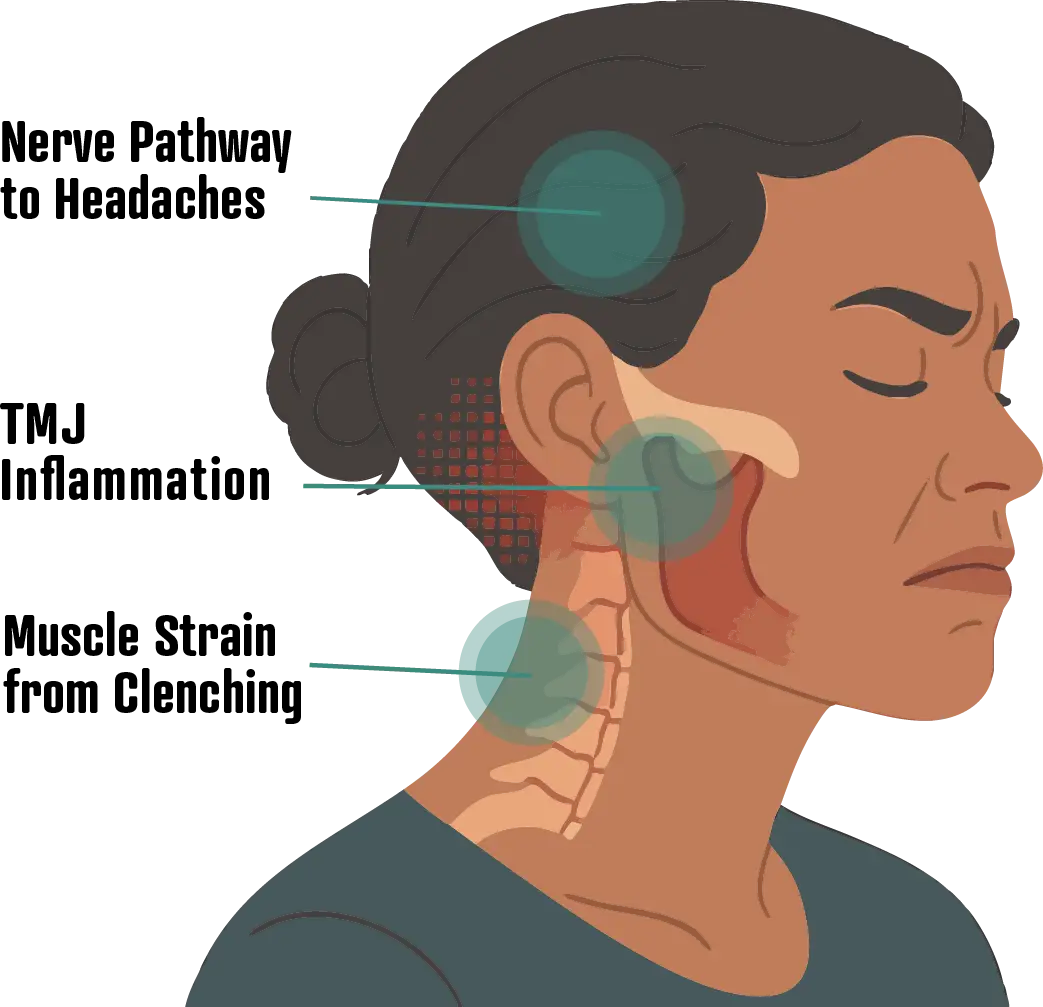Migraines That Keep Coming Back?
TMJ imbalance can irritate nerves and overwork jaw and temple muscles, which may trigger or worsen migraine patterns. At the TMJ & Sleep Therapy Centre of Kansas City, we look past the symptoms to correct the source and help you feel like yourself again.
Understanding Migraines and Their Link to TMJ
Migraines are more than just headaches — they’re often the result of complex nerve and muscle imbalances throughout the head and neck. For many patients, tension in the jaw joint (TMJ) and surrounding muscles can trigger or worsen migraine symptoms. When the temporomandibular joint becomes inflamed or misaligned, it can compress nearby nerves and blood vessels, leading to recurring pain episodes that radiate behind the eyes, across the temples, or down the neck.
“Up to 80% of chronic headache sufferers have some degree of temporomandibular dysfunction.”
At the TMJ & Sleep Therapy Centre of New Orleans, we evaluate how jaw position, muscle strain, and airway obstruction contribute to your migraines. By addressing the true source of dysfunction rather than simply treating symptoms, we can help you achieve lasting, drug-free relief.
When To Seek Treatment
Recurring or daily headaches may indicate chronic muscle tension or nerve irritation in the jaw and neck.
Pain around the temples, eyes, or cheeks is often caused by overworked jaw muscles and inflammation near the TMJ.
Clenching or grinding during the day or while sleeping can strain cranial muscles that trigger migraine patterns.
Restricted neck movement or upper shoulder tension may indicate an imbalance in jaw posture or nerve pathways.
Relief begins with the right diagnosis
TMJ-related migraines are treatable. Our non-surgical therapies at the TMJ & Sleep Therapy Centre of New Orleans are designed to address the root cause of your pain and restore lasting comfort. Schedule your consultation today.

Frequently Asked Questions About Migraines
We know migraines can feel unpredictable and frustrating. Here are some of the most common questions patients ask about TMJ-related headaches and how we treat them.
Yes. When the jaw joint becomes misaligned or inflamed, it can irritate nearby cranial nerves and muscles. This irritation often triggers tension-type headaches or true migraines that radiate through the temples and around the eyes.
TMJ-related headaches often start in the jaw or temples and are associated with muscle tension or joint pain. Migraines tend to include additional neurological symptoms such as light sensitivity, nausea, and throbbing pain. Many patients experience both simultaneously.
A store-bought nightguard may protect your teeth from grinding, but it rarely corrects the underlying jaw imbalance that contributes to migraines. A custom orthotic designed by our specialists realigns your bite and helps reduce nerve compression for lasting relief.
Most patients begin to feel noticeable improvement within the first month of treatment. Full stabilization often occurs within 3–4 months, depending on the severity and contributing factors.
Not at all. Our therapies are non-invasive and focused on comfort and healing. Many patients actually experience relief during the first session.
TMJ & Sleep Therapy Centre
Global Expertise
As proud members of TMJ International, we are part of a global team dedicated to advancing collaborative care in TMJ disorders and sleep therapy. Together, we bring innovation, expertise, and compassionate treatment to help patients find lasting relief and a healthier quality of life.

If you’re struggling with jaw pain, headaches, or sleep issues, the TMJ & Sleep Therapy Centre of Kansas City is here to help. Our team specializes in non-surgical TMJ and sleep therapy solutions designed to restore comfort and improve your quality of life.




